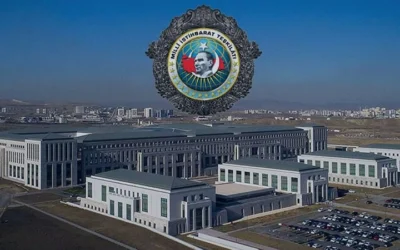An Analysis Based on Hakan Fidan’s Master Thesis
Intelligence services play a pivotal role in shaping and implementing foreign policy. They provide the foundational knowledge required for informed decision-making, particularly in geopolitically sensitive regions like Turkey.
Hakan Fidan, todays Foreign Minister and a leading political figure in Turkey, addressed this topic in his 1999 master thesis titled “Intelligence and Foreign Policy: A Comparative Study of the United Kingdom, the United States, and Turkish Intelligence Systems.”[1] This work not only laid the groundwork for Fidan’s career but also offers valuable insights into the weaknesses and potential of Turkey’s intelligence system. I will try to examine the main arguments of Fidan’s thesis, the practical implementation of its proposals, and their relevance in today’s security landscape.
In his thesis, Hakan Fidan argued that an effective foreign policy is unattainable without a robust intelligence structure. In the opening chapters, Fidan describes various types of intelligence services (e.g., security, military, economic) and details methods like HUMINT, SIGINT, and OSINT for information collection and analysis.
A key focus of the thesis is the comparison between British and American systems. Both countries maintain separate organizations for foreign and domestic intelligence (e.g., MI6 and the CIA), a separation that Turkey lacks. The Turkish National Intelligence Organization (MIT) combines these functions, which, according to Fidan, results in significant gaps in foreign intelligence capabilities. He also criticized the lack of external oversight and coordination within Turkey’s intelligence community.
Fidan proposed establishing an independent foreign intelligence agency, improving institutional oversight, and integrating contributions from academia and civil society. These reforms, he asserted, are crucial for safeguarding Turkey’s national interests in a rapidly changing geopolitical environment.
The recommendations from Fidan’s thesis are reflected in his later professional undertakings. As the head of Turkish National Intelligence – MIT, he implemented many of these reforms, such as creating a dedicated Signal Intelligence Department and integrating the Turkish military’s electronic intelligence command into the MIT. Under his leadership, MIT significantly enhanced its foreign intelligence operations.
In his current role as Foreign Minister, Fidan continues to emphasize the integration of intelligence into foreign policy. Institutional reforms enacted in 2024[2],[3] have further embedded the Ministry of Foreign Affairs into Turkey’s national security architecture. The establishment of new Directorates for Intelligence and Security Affairs, Mediation as well as Diplomatic Security underscores his belief in the necessity of blending diplomacy, security, and intelligence. Overall, the new Directorates strengthens the position of the Turkish Foreign Ministry in the national security architecture and underscores the increasing importance of security policy issues in diplomacy.
From a historical perspective, Fidan’s reforms cannot be viewed in isolation. The dysfunctionality of Turkish institutions in the 1990s and the geopolitical shifts following the Cold War underscored the need for a more robust and coordinated intelligence structure. In this context, Fidan’s measures appear as a logical progression.
Another significant element is Turkey’s shift toward a more autonomous foreign policy, moving away from reliance on Western allies. This trend, which began after the Cold War, aligns with Fidan’s vision of a Turkey capable of independently defining and pursuing its strategic objectives. Intelligence reforms are central to realizing this vision.
Fidan’s approach demonstrates a clear strategic vision: strengthening the national security infrastructure and its integration with foreign policy. The creation of new institutions and the enhancement of existing structures are notable achievements. However, these reforms also risk concentrating power in a few hands, especially given the lack of external oversight for MIT. Furthermore, the effectiveness of the newly established directorates in improving foreign intelligence capabilities remains to be seen.
A further critique of Hakan Fidan’s leadership concerns his appointments to senior positions within the Ministry of Foreign Affairs. Notably, two of the four Deputy Ministers are not career diplomats, with one, Nuh Yilmaz, having previously served as Fidan’s Press Advisor during his tenure at MIT. Additionally, at least six Director Generals have been transferred from MIT to key Directorates within the Ministry, including those for Personnel, Legal Affairs, Intelligence & Security, Information Technology, Planning & Coordination, and Diplomatic Security. Fidan has defended these appointments, suggesting that MIT and the Ministry are “sister organizations,” thereby making the exchange of personnel a natural and unremarkable occurrence[4].
Through his master thesis and the subsequent implementation of its proposals, Hakan Fidan has made a significant contribution to Turkish foreign and security policy. His focus on integrating intelligence services into the national security architecture and strengthening foreign intelligence capabilities is groundbreaking. However, challenges remain, particularly concerning transparency and external accountability. The long-term success of Fidan’s reforms will depend on whether they lead to a sustainable improvement in decision-making foundations and Turkey’s geopolitical agency. The interplay of diplomacy, security, and intelligence, as advocated by Fidan, could serve as a model for other countries in similar situations.
Conclusion
In conclusion, Hakan Fidan’s work, both in his master thesis and as a practitioner, has undeniably shaped the trajectory of Turkish foreign and security policy. His thesis emphasized the indispensable role of intelligence services in crafting a successful foreign policy, providing critical insights into the limitations of Turkey’s intelligence apparatus in the late 1990s. By highlighting the fragmentation of intelligence functions in Turkey and advocating for reforms such as an independent foreign intelligence agency, Fidan sought to ensure that Turkey could better safeguard its national interests in an increasingly complex global environment. His focus on integrating intelligence services with foreign policy has since become a central pillar of Turkey’s national security strategy.
The implementation of Fidan’s recommendations, particularly during his tenure as the head of MIT and later as Foreign Minister, demonstrates the significant strides Turkey has made in reforming its intelligence structure. The creation of new intelligence and security directorates, as well as the integration of military and diplomatic spheres, reflects Fidan’s vision for a more cohesive and agile security architecture. These reforms not only enhance Turkey’s ability to respond to emerging threats but also position it to pursue a more independent and assertive foreign policy, free from overreliance on traditional Western allies.
However, while Fidan’s contributions are commendable, the reforms are not without their challenges. The concentration of power within a few key institutions, particularly MIT, raises concerns about the lack of external oversight and transparency. The long-term success of these reforms will depend on their ability to foster more accountable and effective decision-making processes. Nonetheless, Fidan’s strategic vision, blending diplomacy, security, and intelligence, offers a framework that could inspire other nations facing similar geopolitical pressures, potentially serving as a model for intelligence-driven foreign policy.
[1] https://tez.yok.gov.tr/UlusalTezMerkezi/tezDetay.jsp?id=pGLbbkL9jx3T-q0DdNGYnQ&no=pGLbbkL9jx3T-q0DdNGYnQ
[2] https://www.resmigazete.gov.tr/eskiler/2024/04/20240406-1.htm
[3] https://www.resmigazete.gov.tr/eskiler/2024/09/20240914-5.pdf





0 Comments